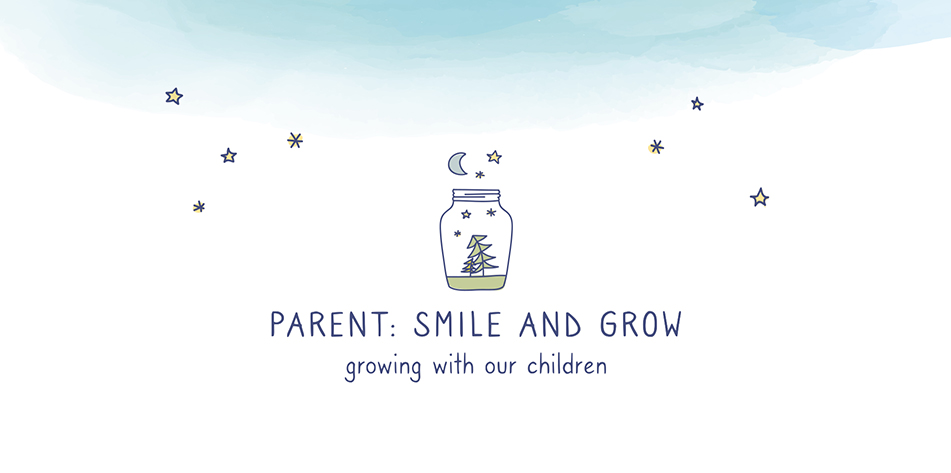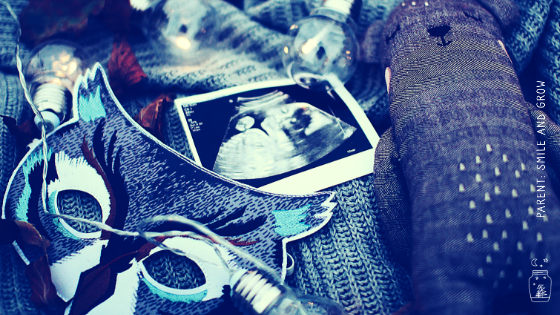Here we come to the last episode of this series about stress. As a new parent, you might have felt overwhelmed with emotion.. marveled at your emotional reactions, and maybe, you even felt bad about it. Because feeling sad is not very sexy in a world that wants us smiling and full of energy all the time. Let’s try to cast some light on stress in pregnancy and postpartum depression – so as not to feel “wrong” for our vulnerability.
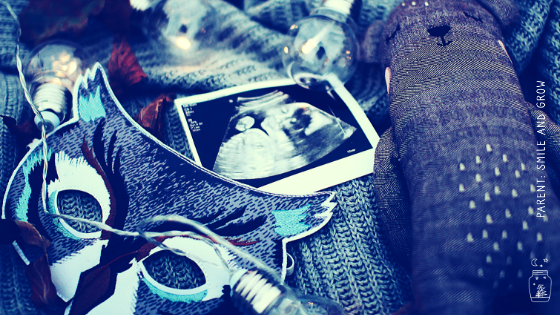
Table of Contents
It was a dark and stormy evening.
One night four years ago, my husband and I had a heated argument. Like all couples made of opposites, we were in one of those phases where differences made us fly away from each other. And I was pregnant.
Since I’m a predominantly emotional person, I chose to follow the impulsiveness of “making each other feel guilty“, and I left slamming the door.
Dishevelled, with a big belly, in slippers and nightgown, what a sight I was, wandering around the condominium garden while crying noisily. I still remember the deep pain, made even more acute by the guilt for the little baby in my belly.
“I’m sorry I’m not offering you the ideal conditions to come into the world” I sobbed.
I put a little bit of a drama, I admit. But I was afraid, however absurd it may sound now, that my tears and anguish might hurt the child. (Obviously thus distressing me even more.)
Don’t they tell you to be as quiet as possible during pregnancy? To surround yourself with love and affection and softness, because pregnancy’s a delicate period?
The duty to feel happy
Let’s move on a few months. Here he is, my baby boy. Healthy and perfect. I’m so happy to welcome him.
Still, tears lurk. I feel the bubble of my pain set aside rolling here and there, between my stomach and my throat.
“You must be happy for your children”
“It’s hormones. It’s just hormones.
So, as soon as someone sees me, I put a smile on my face, because hey, you’re having the best moments of your life! You don’t want to give in to sadness! What if you get postnatal depression?

It’s time to learn
Don’t think I was sad all the time, on the contrary: I was enthusiastic, full of energy – and very tired at the same time, like any mom juggling work, young children and husband; an acrobat looking for a balance that won’t precipitate her into the void.
Because those months between pregnancy, childbirth and breastfeeding are wonderful, of course; but of an intensity that overwhelms and leaves you stunned, frazzled and lonely like a shipwreck.
You dress up with expectations, you want to live up to that creature that was given to you. And it’s hard to conceive, in our binary world, that one can be over the moon and emotionally shocked at the same time.
Fast-forward to a few years later. I’ve survived. And I wanted to see clearer.
-
Does stress really hurt in pregnancy? Do we really have to be careful and live in an enchanted bubble?
-
And what happens after childbirth? How can we accept the upheaval, while remaining attentive and available to our children?
-
What is the role of fathers in all this?
What happens to the fetus in case of stress in pregnancy
If I could speak to myself that night, I’d say,
“Don’t worry. It’s not stress or the occasional crying the problem. You’re doing your best.”
Especially women : we tend to overload ourselves with guilt. We think we need that unattainable perfection to feel legitimate.
The goal of this article is NOT to provide an additional source of anxiety.
On the contrary: on the one hand, it’s to get a better understanding of what happens in order to act in awareness; on the other hand, to spread how NORMAL it is to feel certain emotions, which have nothing negative in themselves.
By the way, it’s not yet clear how stress and anxiety in pregnancy are related with the fetus’ development.
So far, a relationship has been identified between strong levels of stress and emotional and behavioral development of infants and children.
(for example:
- a more “difficult” temperament;
- problems falling asleep;
- a tendency to be fearful).
The reason why we still don’t know exactly how this happens, is that so far, the experiments have been done mainly on animals. Let’s say, mice under a level of stress that I hope we will hardly ever have to experience in our life.
Among the hypotheses, there are:
-
lower blood pressure to the placenta
-
contact with cortisol that in some cases would be able to penetrate the placenta
-
exposure to serotonin
In case of extreme stress (such as physical violence and abuse), cortisol can cause genetic changes in the fetus.
Stress in pregnancy: is it always bad?
As seen in previous articles, a certain level of stress is not harmful at all, on the contrary: it acts as a stimulant!
And to dispel a further myth, I think it’s worth remembering that about 20% of women suffer from anxiety and/or depression in pregnancy – for different reasons that may -or may not- be related to pregnancy-related factors.
In any case, it’s not rare ! Even less so if instead of falling into a “pathological” case we are subject to more or less intense mood swings.
There is certainly a link between the mother’s emotional experience and the fetus’; but it is unthinkable, absurd and even harmful to shy away from any “negative” emotion and to live constantly in joy and good humor.
Dads and their influence on stress in pregnancy
Fathers’ role is fundamental, although indirect :
-
Indirect because there is no physical link between his emotional experience and that of the baby;
-
because it affects the emotional state of the mother.
What happens to men during pregnancy?
Physical changes (yes!):
-
increase in the level of cortisol when the pregnancy is discovered;
-
lower level of testosterone just before childbirth and up to about 6 weeks after birth
Emotional changes :
-
reflection on the relationship with one’s father
-
jealousy of the place taken by the newcomer in the life of his partner
-
non-acceptance of physical changes in the mother’s body
-
feeling overwhelmed by the new responsibilities
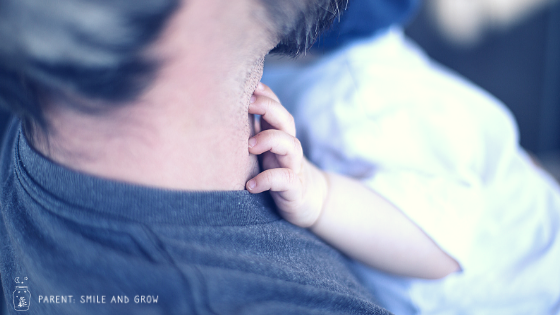
Mental images and a relationship that is created : from the beginning of pregnancy
Do you remember when you started feeling the baby move the first time?
I remember so well the day I realized that the rhythmic movement I felt from time to time was hiccups. Amazing!
Just then, mom and dad begin to form a mental image, or representation, of their child.
And no, they’re not crazy, actually!
This image, although “fictional”, is very important : it constitutes the first deep bond between parent and child.
It is also important because it seems stable over time (say up to 12 months of the baby); that means, it allows to detect potential problems in the very first parent-child relationship, as well as attachment’s type and bond between the newborn and her parents.
Not only that: it’s while building this “mental projection” that the mother, often unconsciously, reevaluates her relationship with her own mother; and that’s where all the unresolved issues in childhood can emerge.
Pregnancy stress and postpartum depression : is there a link?
Is it possible to establish a link between stress in pregnancy (in the form of strong pressures and changes) and postpartum depression? Partly.
Again, it’s the level of stress that counts. Some research has shown a correlation between strong levels of stress and postnatal depression. But we are mainly talking about serious situations: violence, abuse, trauma.
Three considerations:
-
Yes, if you find yourself in such a difficult situation, it is important to ask for help.
-
No, you don’t need to overload yourself with anxiety if you happen to cry or quarrel with someone once in a while.
-
Anyway, there’s nothing wrong with you.
Postpartum depression can have several possible causes, the topic deserves to be covered in a separate article.
What I would like to point out is that all women after childbirth go through a strong hormonal change, with the imbalances that follow:
-
you’ll be crying suddenly and for no apparent reason.
-
sometimes you will feel alone and misunderstood.
If it happens to you, don’t be ashamed of it. Cry if you have to cry. Look for support.
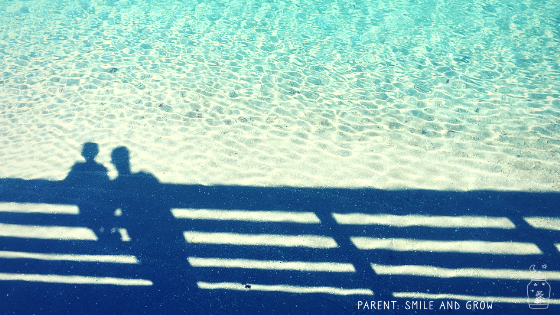
What happens next? Post-breastfeeding depression
Have you ever heard of it? At that time, I hadn’t.
I had decided to continue breastfeeding even after going back to work, until it became too tiring, and I hadn’t enough milk. Around me, I could feel that family, friends.. expected me to wean my baby. He was 9 months old.
During the last feedings, I cried. I didn’t want it to be the last time. The bubble was tightening my throat, again.
Some time later, I stumbled upon an article about post-breastfeeding depression.
I cried as I read about the inexplicably dark months that the author, an American journalist, described so well. (You can read it here)
It took a weight off my shoulders.
Because I thought there was something wrong with me. I wasn’t clinically depressed, let’s be clear; but I often had mood swings and a feeling of sadness mixed with tiredness that accompanied me at all times.
And I stopped feeling guilty.
Guess what? When you stop breastfeeding, the level of two hormones suddenly drops: oxytocin and prolactin, which are the hormones that make breastfeeding work. They are also the hormones connected to feelings of well-being and energy.
Time for our body to adapt, and everything is back to normal.
Don’t feel weird, wrong, nor flawed. First of all, because it’s not true. Secondly, because these thoughts isolate you. Don’t deny what you’re feeling, don’t judge yourself. Your world needs you.
The stress series
Here we are at the last episode of the series dedicated to stress! Let me know if this post was useful to you, and share !
Sources and references
Note : the readings I mention here include mainly the books that I used to write this article, which I loved reading, or sometimes that I still haven’t personally read but were suggested to me and are on my wish-list. The links to Amazon (UK or US) are affiliates: it means that if you click and decide to make a purchase, I perceive a small commission at no extra cost to you.
-
It is from this book that I have taken most of the information for the latest articles: “[eafl id=”1185″ name=”Why love matters UK” text=”Why love matters”]” by Sue Gerhardt talks about the link between relationships and brain development, with real life examples as to the possible consequences. ([eafl id=”3636″ name=”Why love matters sue gerhardt US edition” text=”Here’s the US edition”])
-
This is an indispensable guide : “[eafl id=”1317″ name=”The psychology of babies Lynne Murray” text=”The Psychology of Babies”]” is full of pictures illustrating how to interact with children and accompany them in their first development, in delicate stages such as teaching them to fall asleep, leaving them for the first time in childcare, and so on; all with a light tone, not guilty but informative. For me, a rare pearl that unfortunately I discovered “late”. ([eafl id=”3637″ name=”psychology of babies lynne murray us edition” text=”Here’s the US edition”])
-
An indispensable reading to counter-balance the “pessimistic” thesis on stress: “[eafl id=”3361″ name=”The Upside of Stress: Why Stress Is Good for You, and How to Get Good at It” text=”The Upside of Stress”]” by Kelly McGonigal ([eafl id=”3638″ name=”upside of stress mcgonigal us edition” text=”Here’s the US edition”])
-
Finally, “[eafl id=”3639″ name=”parenting from the inside-out UK daniel siegel” text=”Parenting from the Inside-out”]” by Daniel J. Siegel leads to a work of “self-analysis” on the link between our own history and that of our children. ([eafl id=”3640″ name=”parenting from the inside-out daniel j siegel US edition” text=”Here’s the US edition”])
